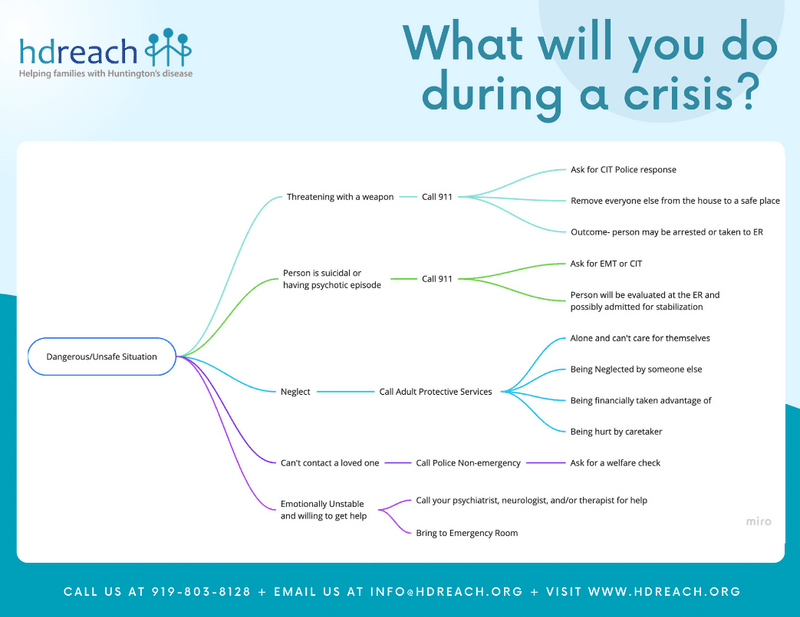A family safety plan uses strategies to protect everyone in the household, including the person with Huntington’s disease.
A good plan includes multiple ways to access help and prepare for your safety. The following suggestions for your plan cover a range of situations. Figure out which options work best for you in your home and while you’re away.
Steps for Keeping the Family Safe
Prepare other people to become involved:
- Tell people you trust about your concerns, any irritability you have observed, and any aggressive behavior you have witnessed/experienced. Be clear about whether you are asking for emotional support or asking for tangible ways they can help you.
- Ask trusted neighbors or friends to call the police if they observe certain kinds of activities at your home such as fighting, loud noises, or harmful activity.
- If you have children, identify friends, neighbors, and/or relatives who your children can go to immediately or for an overnight if you have to go to the hospital or the police station.
- Contact your local law enforcement and Crisis Intervention Team (CIT) officers to explain a member of your household has HD. You can let them know chorea may appear to be agitation or intoxication and extra time may be needed to communicate with the person with HD. Watch this video to learn more about working with law enforcement.
- Personal Health ID tags give first responders immediate information about HD and contact information to get in touch with family or medical providers. Shoe tags have been highly recommended by families. HD Reach offers a 20% off group discount on medical ID bracelets at Road ID, use this link and enter "HD Reach" as your Group Name to get your 20% off code! https://roadid.com/?rfsn=6851411.a8bcafa&of=6X8Y4
Create a safer environment:
- Remove all weapons in your home (firearms, knives, bats, etc.). If that’s impossible, put weapons in a locked container and remove the key from the home.
- Remove or hide any other items in the home that can be used as a weapon or to destroy property (e.g. knives and other sharp objects, matches and lighters, any heavy or blunt objects, etc.).
- Install smoke detectors on each floor and keep fire extinguishers easily accessible.
- Lock away or hide extra medications.
- Figure out ways to hide, isolate or get out of each room in your home. During a crisis, position yourself closest to a door or other safe exit point.
- If you need to isolate yourself in a room, consider whether the room has a lock on the door, telephone and an easy way to exit. Avoid kitchens and garages where knives or other potential weapons are kept; and avoid rooms where you might be trapped, such as the bathroom or other small space.
Planning for making a quick exit:
- Figure out who will help you if you need to leave your home quickly.
- Figure out who can store an Emergency Bag (see checklist below) for you.
- Think about people who might lend you money in an emergency.
- Make plans for your pets if you ever need to leave your home quickly.
- Think about multiple ways to get out of your home safely. Practice ways to get out.
- Think about a safe place you can go after you leave such as:
- A friend's or relative’s home
- A hotel
- A local shelter
- Always try to keep a small amount of money on you for bus fare or rides.
- Complete and regularly update the Family Safety Plan. If you need help thinking through the options, you can work with someone you trust or an HD Reach counselor.
If you make a quick exit:
- Before you leave, try to remove objects that could be used to harm oneself or others. Consider taking car keys or disabling the car so the person with HD won’t be able to drive while agitated.
- As soon as you are safe, contact your local mobile crisis team or call 911 to help the person with HD if you are concerned they may harm themselves or others. If you call the police, ask for a Crisis Intervention Team (CIT) to respond to the crisis. CIT trained officers have specialized skills to deal with individuals with medical or mental health illnesses.
What to take with you or keep ready to go:
You cannot predict when it will be safe to return home, so you need to be prepared to manage your life and the lives of those who depend on you. Some of these items you can try to keep with you, others you may be able to pack in an “emergency bag”.
- Cell phone and charger.
- Money: cash, bank account information, checkbook, and credit/debit cards.
- Keys: home, car, and work.
- Medical care: prescribed medications and medical devices.
- Contact information: address book or cell phone with contacts.
- Valuables: Family photographs, your diary, jewelry, small items of sentimental value.
- Clothing and toiletries for you and other household members.
- Distractions: Your children's favorite small toys, small items that will comfort you.
- Documentation:
- Safety Plan, list of medications, copies of medical records (e.g. psychiatric reports, Community Treatment Orders), documentation of prior aggressive behaviors, and a copy of any Durable power of attorney for the health care of the person with HD.
What to Expect During a Crisis
When you feel that you or a member of your household is in danger or serious property damage is likely, contact outside help. A person with HD might develop symptoms that make living in a hospital or other protective environment the best option for a short period of time. If the person with HD is unaware of their symptoms and highly resistant to care, crisis services may be the only way to get them the care they need to provide symptomatic relief. Many families who have used crisis services report the long-term improvement in symptoms and family life is well worth the difficulty of calling in outside help.
When asking for immediate assistance from Mobile crisis or emergency services try to remain calm and provide the following information:
- Tell them someone is experiencing a mental health crisis and suffers from Huntington’s disease
- Explain the nature of the emergency
- Explain your relationship to the person in crisis
- Describe any weapon(s) involved
- Request a Crisis Intervention Training (CIT) Officer
- When emergency responders arrive, tell them the person has HD, explain any past violence, suicide attempts, drug use, and stressors. (Tips for keeping a Documenting Important Information file).
- Provide a First Responders Information sheet by text or email or have a copy at home.
- Once 911 has been called and officers arrive, you don’t control the situation.
If the situation can’t be resolved on site, taking the person with HD to an emergency room may be the best option. If a law enforcement vehicle transports the person, the usual policy is to use handcuffs. This can be very upsetting for everyone involved. The officer may decide that taking a person into custody is more appropriate, but you can request and encourage the officers to view the situation as a mental health crisis.
Going to the emergency room may involve a lot of waiting. Some items to consider bringing:
- Distractions to keep the person with HD calm
- Activities to occupy other members of the family
- Safety Plan and Documenting Important Information file with all medications and contact information for medical providers
Who to call during crisis situations:

Please note that professionals have certain ethical and legal duties requiring that they report an unsafe situation. These measures are in place to keep everyone safe, and not to penalize people with HD or their families when overwhelmed by a crisis.
After an Episode of Aggression or Irritability
- Contact members of your health care team as soon as possible after the episode of aggression. By calling you are not violating the confidentiality of the patient, you are sharing your observations about irritability and aggression.
- Describe the events calmly and objectively. Make some notes before the call to be certain you cover all the facts. Be sure to include information related to the willingness of the person with HD to participate in going to the doctor and recent compliance with treatment.
- Share your fear of retribution or prior experiences of retribution.
- Clearly request the help of your health care professionals in the management of the HD related symptoms.
Keep a record of events:
Record all acts of aggression, violence or property damage as they occur. This will help determine what threatening behaviors the individual may display during a crisis/aggressive episode and how to safeguard against them. This is also useful information to provide to the individuals’ treatment team or to the police. See how to create a Documenting Important Information file for more information.


